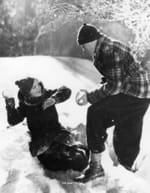
The Many Faces of Hugh Grant – A Review of the BBC Bafta Tribute on the life of Hugh Grant in Film. BBC1 December 23rd, 2019.
When I think of Hugh Grant, I think of Richard Burton in reverse. When Burton first landed on stage and screen it was hard to contain his visceral magnetism and then he went from playing emperors to pirates.
The Prince of Darkness
Who could ever have imagined Hugh Grant would journey from playing fantasy English love gods to a prince of political darkness? In Stephen Frears’s – A Very English Scandal – he plays Jeremy Thorpe the vulpine seventies leader of the liberal party leader sensationally accused of plotting to murder his gay lover Norman Scott to protect his political career at any cost.
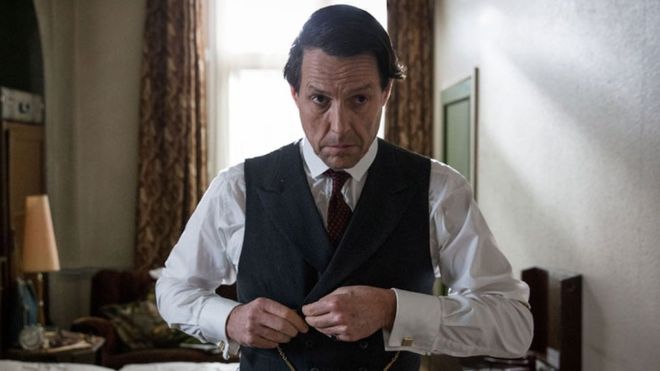
Grant stuns as Thorpe. There is no trace of the beautiful, befuddled Englishman left. Instead, he is all coiled, devilish, dark, debonair charm, Spitting erudition, and glorying in ice-cold, sinister, self-interested pragmatism. Grant studied Thorpe’s mannerisms on Youtube and gets every little detail right, even down to the way he curls his lip.
As Richard Curtis predicts, “I have a feeling that the next ten years are going to be very interesting, if Hugh can be bothered.”
A Passport to Oxbridge
Hugh Grant grew up in Chiswick, the son of a soldier turned businessman and a mother who was a school teacher. The family had its roots in the gentry and the military but were not wealthy. “People thought we were rich because of the way I speak.” There is a wonderfully down to earth moment in the film where Grant says that he continues to meet half the pupils his mum taught every time he shops in Boots at Heathrow airport.
The Importance of a Good Education
He also makes a point of saying how much he benefited from winning a grant scholarship from the local council to attend Latymer School, which was his passport to Oxbridge. “I’m all for that.”
The English Gentleman
After showing early promise as a comic actor, Hugh Grant went from struggling sketch artist to a global Hollywood leading man via the phenomenon of Four Weddings and a Funeral, Notting Hill and Love Actually – playing much the same bumbling, effete, upper-class Englishman who somewhat unbelievably struggles to win the girl, despite all the obvious advantages in life, including classical good looks, money, and connections.
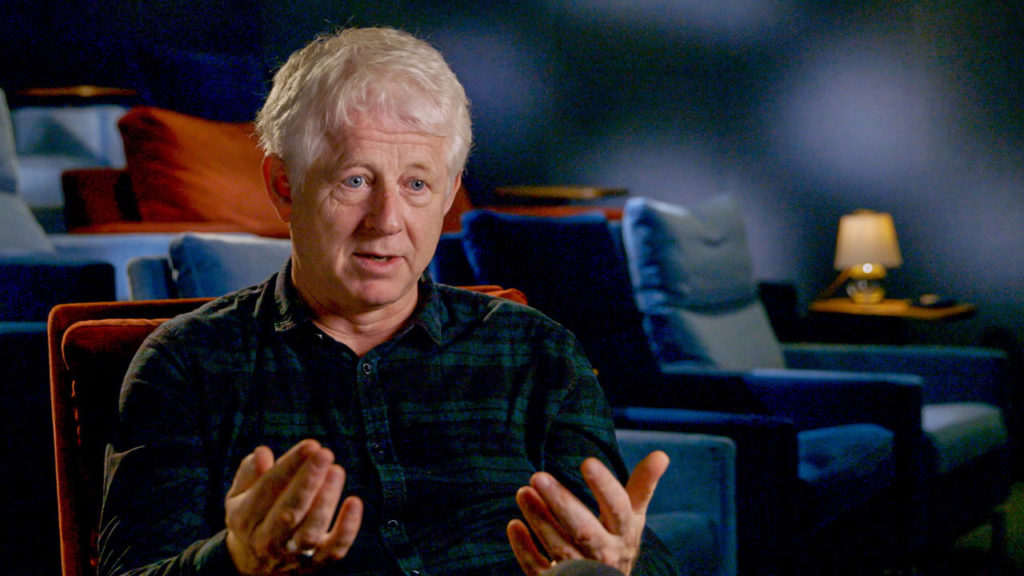
When Hugh first auditioned the role, Curtis, who admits he owns his entire success to Grant, didn’t want him for the part, because he felt audiences wouldn’t find his struggles with women believable. Fortunately for us, he was overruled as Grant demonstrated his genius for romantic comedy and peculiarly English self- deprecation.
“Kissing Hugh isn’t Hard.” Andie McDowell.
In a kittenish moment, Andie McDowell, Grants’ co-star in Four Weddings declares “it was not hard to kiss Hugh’, which comes across in their scenes. There is no shortage of chemistry between the Hollywood star and the newcomer and she says she was not surprised by his enormous success and global stardom. While he admits to mercilessly teasing her on set. Grant is adored by his fans but often dismissed by the critics who relentlessly accuse him of being one dimensional. You can tell it hurts even now. Because he says it does on camera. Which makes him honest and immensely human and rather likable as a person.
Messing Up in Hollywood
Nor does he attempt to gloss over the Divine Brown episode. He simply acknowledges that he messed up. He comes across as very down to earth, while he clearly does like to shine and he is quite competitive with fellow leading actors including Emma Thompson and Meryl Streep. In a fun moment, he reveals that his Bafta trophy isn’t hidden away, it’s in a place where everyone can see it as soon as they come into his house!
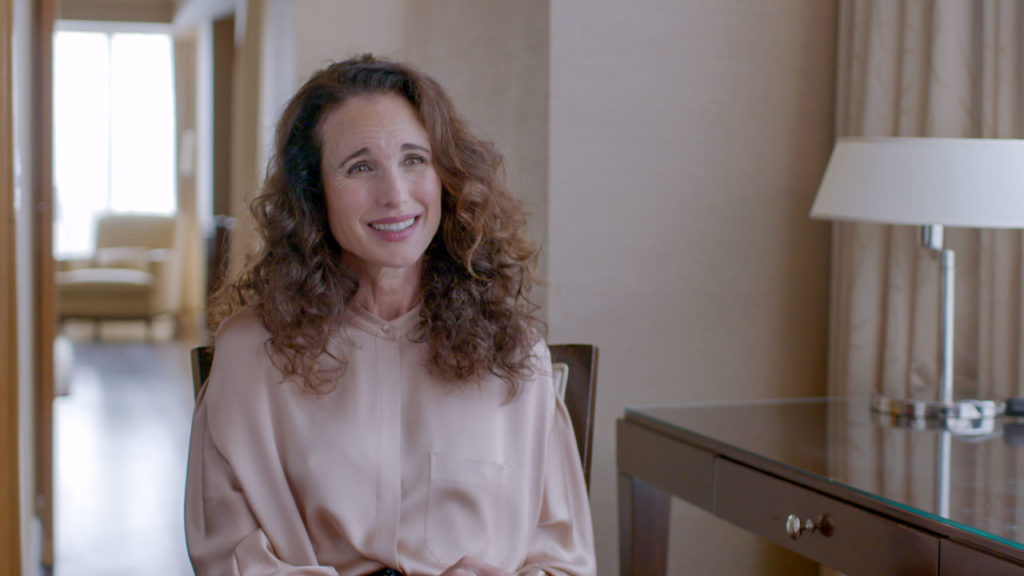
There is a point in the programme where he discusses his reluctance to keep playing a stereotype of the fantasy ‘English Gentleman’ for Richard Curtis, but at the same time it was box office gold and it bankrolls a rather lovely life which includes fun, film star toys such as the Aston Martin Vantage Nicholas Hoult persuaded him he needed to have during the making of About a Boy.
Privilege and Pretension
While this Bafta BBC tribute to Hugh Grant is at times far too deferential and sugar-sweet. How many times can Sandra Bullock insist that Hugh Grant is a national treasure? Yet it does shed fascinating light into Grant’s early life and motivations.
Falling into Movie Stardom
Once you understand that he fell into movie stardom, his choice to accept everything he was offered after Four Weddings and a Funeral makes sense. He knows what it is like to be out of work. He performed in plays at school and at Oxford, but it appears there was no glittering masterplan, just that silly, pretentious film Privileged, which suited the times perfectly.
Acting Was Never Meant to Be a Professional Job.
Perhaps we should blame is youthful Oxford persona for all the subsequent Richard Curtis roles and the revelation that he had no burning desire to become an actor at all. He was simply a pretentious, bright young thing with an Oxbridge education, showing off and having flings with fellow actors. “Doing plays was just fun, I never thought I would do it as a professional job,” he says.
It was his brother who worked as a banker, who told him to put on a suit, go to an audition and start contributing to the household expenditure.
Beautiful Maurice
I wonder what Hugh would have done if his big brother hadn’t nagged him to go to the audition for the Merchant Ivory film Maurice? The film was a box office hit, especially in Japan, where the women especially love the myth of the ‘English Gentleman’ and sent him thousands of delicate pieces of origami with the words ‘ I love you Hugh’ while Grant praises the beautiful cinematography.
The David Attenborough Sketch
One of the most fascinating early clips from his career shows a young Hugh Grant on tv impersonating Sir David Attenborough. He delivers each hushed mannerism and carefully chosen deliberation with uncanny accuracy, comic timing – and something more, star quality. As in many great careers, there is a strong element of luck together with a remarkable comic talent.
Joseph and Mary and Russel Harty
After gaining his equity card treading the boards at the Nottingham Playhouse, playing the third tree from the left, Grant formed a trio, mostly out of boredom, and took a show to the Edinburgh Fringe. They were playing to tiny audiences of just seven people until the late Russel Harty invited them on to his show to do their Joseph and Mary sketch.
A Hit at the Edinburgh Fringe
Once again it is Grant who shines in the sketch. When they returned to Edinburgh, the power of television transformed the show into a huge hit.
Maurice would follow soon
after, and then Grant admits to taking everything he was offered until his
career started to go in the wrong direction. He was just beginning to get very
disillusioned when he was called to the Four Weddings audition in Carnaby Street.
Wounded by Criticism
It really isn’t the actor’s fault if they are accused of reprising the same roles. When an actor achieves great success, they will naturally be offered similar roles. Typecasting happens to every successful actor unless they push hard against it. What is clear is that Hugh is wounded by the criticism that his acting lacks depth or variety. Perhaps his greatest challenge and genius is that he makes his comic romantic roles look too easy, too effortless, when in fact they take great skill.
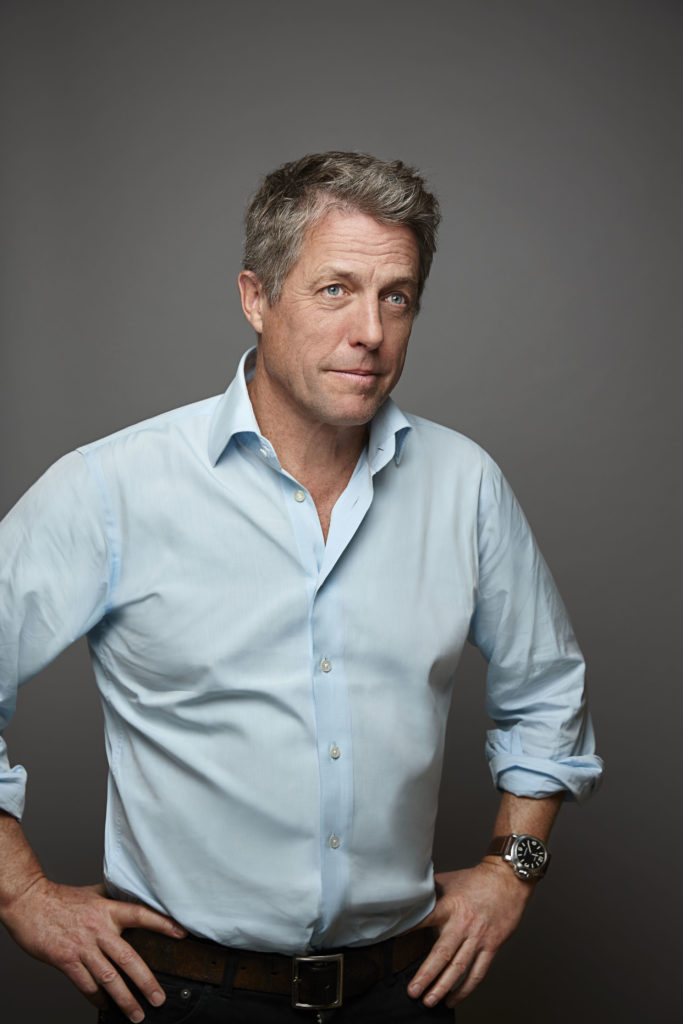
In the end, it was Hugh Grant who eventually took a risk when he decided to play the role of Will Freeman in Nick Hornby’s About a Boy. Will is the antithesis of Grant’s earlier romanticised characters. He is more north London that west London, he drives a fast car, revels in casual flings, and joins a single parent support group, with the calculated intention of picking up desperate, lonely women for sex, which Grant describes as ‘marvellously black’. His performance certainly blows away any vestiges of the shambolic Mr nice guy and does nothing to dent his status as a sex symbol. However, he isn’t the worst kind of cad either. He is more of a lost man, who has cultivated a life of blankness in order to avoid really living or feeling anything until a boy who doesn’t fit appeals to his humanity. Grant portrays his slow transformation with subtlety, shame, humility, and bravery.
The critics warmed to this new direction, and About a Boy was well received. While Nicholas Hoult admires the effect he seems to have on the opposite sex.

His roles in the Brigitte Jones franchise also followed this darker comic direction, as the serial cad and girlfriend stealer, Daniel Cleaver. Here, I can’t help feeling Hugh relished demolishing his status as a romantic leading man. He also must have studied a few tv and media bosses, to get the sense of sleaziness, bravado and moral bankruptcy just right.
After Grant became increasingly interested in politics and his involvement in the phone-hacking scandal, he announced his decision to retire from film acting.
Retirement and Paddington 2
Fortunately for us, that decision
didn’t last long and he was lured back to film with three roles that have
redefined his career both as a stellar comic actor and as a serious character
actor – Florence Foster Jenkins, opposite Meryl Streep, Paddington 2 and a very
English Scandal for Stephen Frears.
A Fred Astaire Moment
There are many delicious scenes in Paddington 2, the ease with which he plays multiple characters and the delightful discovery that he is not too egotistical or vain to portray the washed-up leading man, now reduced to advertising dog food. As for the swansong, eat your heart out Sir Larry! Dressed from head to toe in Prison regulation sugar almond pink he performs a dance routine to rival Fred Astaire with the immortal line – ‘ all I needed was a captive audience’.
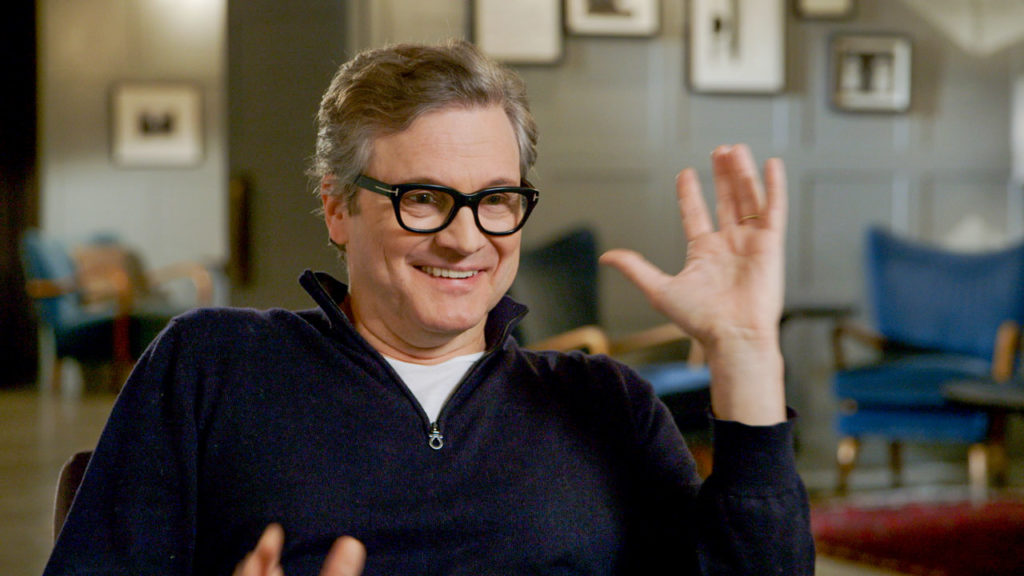
While Colin Firth, Hugh’s love rival in the Bridget Jones films lets the cat out of the bag and declares that secretly ‘Hugh is rather nice’ but wouldn’t want anyone to know that. You also sense that this uniquely English icon prefers to be unknowable, to keep people guessing which is just how it should be with a great actor, for if we feel we have their measure, what is the point in watching them perform? Their job is to inhabit each new role and make us believe absolutely in the character.
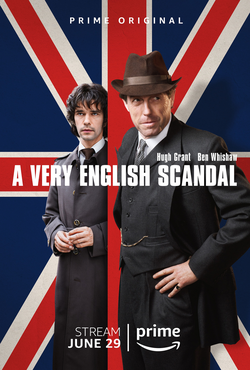
As Jeremy Thorpe, Hugh, who grow up vividly remembering the scandal, is Thorpe. He is transformed by the genius of great makeup and getting out on his bike to slim down to Jeremy Thorpe’s famously gaunt, reptilian frame. While the lines from Stephen Frears’ to revel in include him greedily declaring that he wants to be happy on as many occasions as possible while also declaring that he is a great believer in the idea of the European Union.
“He is just as much of a method actor as Marlon Brando, but he would rather die than say anything like that.” Stephen Frears.
As for his growing artistic flirtation with Stephen Frears, long may it continue and do blame the French who take acting very seriously indeed. (Actors are so camp). Grant is astonished by the frugal BBC budgets, which can only stretch to filming the house of commons scenes in a barn in West Sussex, complete with mooing cows, though the economy of style suits his acting. So far it has given us Grant’s quiet, restrained tragedy of a man with two lives in Florence Foster Jenkins and the definitive Jeremy Thorpe. Frears says, ” Hugh Grant is just as much of a method actor as Marlon Brando, but he would die rather than say anything like that.”
Politics, Phone Hacking & Real Life
Do you recall the scene in A Very English Scandal where Thorpe espouses the merits of joining the European Union and talks about the economic benefits of immigration? What different times we live in now and Hugh Grant the man, not the actor is also emerging in a new role, as a thorn to the establishment, and perhaps a future politician.
“I Became Interested in Real Life, not Synthetic Life.”
He says simply, “I became very interested in real life not the synthetic life of acting.” So, who knows, maybe one day this much celebrated and all too human Englishman will run for parliament and the office of PM. Then, he can reprise the dance scene that delighted millions of fans around the world and humanised the office of prime minister. We could do with a dash of Hollywood stardust right now.
Hugh Grant – A Life in Film is on BBC1 23rd December 2019
Want to read more reviews and features from Alison Jane Reid? Then read her review of Sanditon, recently dramatised by ITV and Masterpiece PBS – Sanditon Review
Alison Jane Reid is a British Feature Writer. She has been interviewing icons, food, fashion, and sustainability for two decades. She also writes books and works as a consultant for the world’s ethical luxury brands.
Copyright Alison Jane Reid December 2019.
Pictures Courtesy of the BBC Press Office. Copyright. No Reproduction Without Permission.






